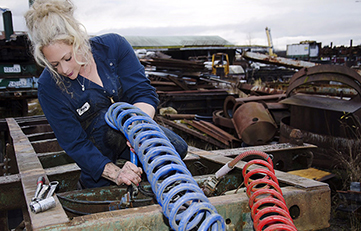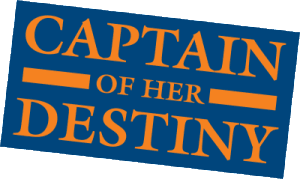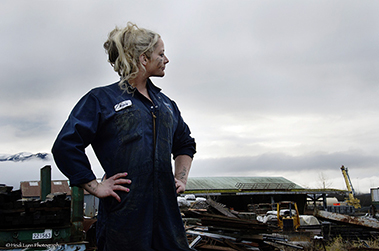First female Caterpillar field mechanic in Alaska
By Lily Raff McCaulou
On her maiden assignment as Caterpillar’s first female field mechanic in Alaska, Nancy Boyce ’08 was dispatched to a remote logging operation. Her mission was to fix a broken excavator on Prince of Wales Island, at the southern tip of the state, and return to the Caterpillar dealership in Juneau in less than a week.
The first leg of her trip, to Ketchikan, landed just as a storm blew in. A tiny float plane had been booked to shuttle her to the island, but the small aircraft couldn’t fly safely in the whipping wind. Boyce, however, didn’t have the luxury of waiting for calmer weather.
“When you’re a field mechanic, you can never say ‘no,’” she said. “You figure it out.”
She would take a ferry instead. A mile from the dock, she started walking—in the pelting rain, lugging a turbo engine and almost 100 pounds of tools. Hours later when she got off the boat, in the tiny town of Craig, the first person she met introduced himself as “Two Stabs.” Mud oozed over her boots with each soggy step as she made her way to the logging camp.
Boyce spent nearly a week in Craig, fixing the excavator as well as a garbage truck, a diesel generator and a rock crusher. She worked around the clock, taking cat naps on the rubber tracks of the rock crusher when she didn’t have time to decamp to her hotel room.
“Probably at 10 different times on that trip, I felt like I would die,” she said.
She finished the repairs just in time to get home by her deadline. On her flight back to Juneau, Boyce didn’t notice that she was too tired to sit up straight. Instead, she reveled in the satisfaction that, thanks to her, an entire lumber company was back up and running. She was the hero.
She was also hooked.
“It has become my addiction to the job,” Boyce said of the feeling of heroism that follows a job well done.
Clark’s diesel program
Years earlier, it was the simple promise of money—and job security—that lured Boyce into the Clark College Diesel Technician program and onto her adventurous career path.
With a pierced nose, long, wild blonde hair and a fondness for mascara, Boyce bucks the stereotype of a diesel mechanic. Now 38, she grew up on a farm north of Vancouver. Wash., with industrious parents who imparted their do-it-yourself attitude onto Boyce and her two brothers.
Boyce was a diligent student, with a natural aptitude for mechanics. She found work fixing machinery at a textile mill, but got laid off when operations shifted to Mexico. She landed another position at a paper mill, but got laid off from that job, too.
However, there was a silver lining: Along with unemployment, she received retraining benefits. So Boyce enrolled in the Diesel Technician program at Clark College. She took twice the full-time course load, graduating a year and a half later with a GPA of 3.99.
Dennis Lloyd, a Clark Diesel professor, says he tells current students about Boyce, for inspiration.
“Every year, on the first day, her name comes up,” Lloyd said. “I mean, she’s a perfect success story.”
Professor Don Gonser, who is also the chair of the Diesel Technology department, said although the program’s official capacity is about 38, there are 57 students currently taking Diesel courses at the college.
“There’s a very robust demand for diesel technicians,” Gonser said. “Practically anything that’s in a store was transported by diesel vehicle, whether it’s rail or truck or ship.”
The program’s three-year employment rate—73 percent—is one of the highest at Clark College.
High-risk work
Upon graduating, Boyce was hired by Halton Co., a Caterpillar dealership in Portland that has since been sold to Peterson.
Boyce specializes in power generation, which is the most dangerous subset of diesel technology because the high-voltage electrical components add another level of risk. It also requires a unique type of dexterity, such as knowing whether one’s hand is level while its view is obscured by machinery.
After two years working in Portland, Boyce looked up the highest-paying Caterpillar dealership in the country, and discovered it was in Juneau, Alaska. Going to Alaska, where people depend on diesel generators for their lives and their livelihoods, was a way to test herself, Boyce believed.
“I’ve always thought that whatever you choose to do, you should do it all the way,” she said. “Why not go big?”
She called the branch manager, who flew her up for an interview two days later. One week after that, she was packing her belongings.
In the field, Boyce had to rely not only on her mechanical knowledge, but her general creativity. On one occasion, she stayed in Juneau to repair The Kestrel, a tug boat that helps transport fuel to far-flung villages. After more than 24 hours of work, she needed a different sized socket to finish the job. If she missed low tide, the ship would have to wait another 24 hours, for the ideal combination of tide and daylight, to leave the port.
“I didn’t have time to drive back to my shop,” Boyce said. “But I thought, the college (University of Alaska Southeast) is right over there and I know they’ve got a diesel program.”
She burst into a classroom, covered in grease, and briskly introduced herself before asking for the tool. As the instructor retrieved it, he asked her to speak to the two female students in the class.
Boyce grabbed the socket and said, “I’m making $100 an hour right now, I’ll see you later.” She ran out of the room and the students cheered.
Later, Boyce was invited back to teach a course in alternating current theory. She rewrote the curriculum and, for the final, had students build generators using motorcycle parts she bought on Craigslist.
A woman?
As a field mechanic, Boyce was often greeted by customers who were irate to see a woman arrive for the job.
“They’d say, ‘Are you kidding me? I’m losing $150,000 a day and they send me a girl?’” she said.
The job usually ended not only with a successful repair, but an apology like this from the client: ‘I’m sorry I doubted you.’
“It’s only a surprise to the rest of the world that I’m successful,” Boyce said confidently, “it’s not a surprise to me at all.”

Boyce at times accepted fresh salmon and caribou jerky as payment for her mechanical work in Alaska. Photo by Heidi Lynn.
Being a woman in a male-dominated industry has other downsides. Boyce says she has been harassed and belittled by coworkers and employers.
In May 2014, Boyce’s grandfather died. Once she got home to Vancouver, Wash., and spent time with her close-knit family, Boyce realized she was unhappy in her job, in part because of the harassment was experiencing. She called her boss and quit.
“I was sad and lonely, and… I had never really been unhappy before,” she said. “I really had to analyze the situation.”
With plenty of money in the bank, Boyce decided to take some time for herself. From her work, Boyce had friends in every dot on the Alaskan map. So she took a road trip and visited them. She fished and hunted. That’s not to say she didn’t work. When Boyce arrived in Dutch Harbor, for example, she inquired about a backhoe she’d once repaired.
“The engine is still running but now the joystick won’t tilt? Well, I’d better take a look,” she remembers saying.
Business owner
Back in Alaska and freed from the profit requirements of an employer, Boyce continued making repairs in exchange for wild mushrooms, or fresh salmon, or caribou jerky. Sometimes she fixed engines for people who had no way to pay her.
“There’s a need,” she said. “But it costs $5,000 to get a technician to some of these places. I had a lot of money saved up, and it made me feel good to help people.”
Later that summer, Boyce took a job as a ship’s engineer, a dream she’d had since watching “The Deadliest Catch.” She sailed along the Aleutian Chain, from Juneau to Bristol Bay, aboard a tender, a boat that collects the catch from small fishing boats and delivers it to a cannery.
When the season ended, she returned to Juneau. At the local Fred Meyer grocery store, which she calls “the hub of Juneau,” she bumped into former customers who asked where she now worked. They’d been asking her former employer for her by name, they said.
Boyce was invigorated by the attention, and launched her own company, PowerTech Generation. Business was slow at first.
Today, she has more work than she can do herself, so she depends on three employees. She says she appreciates the freedom of being her own boss, not only because she can choose which jobs she wants to accept, but also how much to charge each client.
In a native fishing village, Boyce repaired a generator that an entire community depends on. Boyce worked around the clock so the cannery wouldn’t lose its catch, which was refrigerated using the faltering generator. Once she got the machine working again, Boyce stretched out on the office floor, exhausted. She awoke to find herself surrounded by gifts. Jars of seal butter, a Native American delicacy of boiled blubber. Pickled king crab. Smoked salmon. Handmade blankets. A welded shape of Boyce’s zodiac sign. A card that read, “I know you are just doing a job, but I don’t think you understand what your job has done for my ability to care for my family.”
“It feels,” Boyce said, “like what I was meant to do.”
~~~~~~~~~~~~~~
Lily Raff McCaulou is a journalist who lives in Portland, Ore. She is the author of Call of the Mild: Learning to Hunt My Own Dinner, which the San Francisco Chronicle named one of the best books of 2012. Her writing has appeared in The New York Times and The Atlantic.





